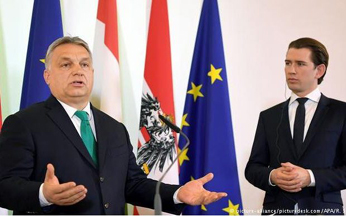BUDAPEST, March 30, 2018 (BSS/AFP) – Football stadiums and street lamps may seem unlikely obstacles for Hungary’s strongman Viktor Orban, who looks set to win a third consecutive term as prime minister in April 8 elections.
However, allegations of fraud in the funding of such public projects have dogged his campaign.
Some voters have clearly turned against the government over the issue with posters bearing the government’s slogan: “For us, Hungary comes first” being defaced to read “For us, money comes first”.
Government spokesman Zoltan Kovacs dismisses the claims, telling AFP: “Hungary has no major problems with corruption, we see that it is a political effort by the opposition trying to make it a major issue.”
The NGO Transparency International disagrees. In its latest world corruption perceptions index, based on surveys by experts, Hungary languished at the bottom of the EU countries surveyed, with only Bulgaria judged more corrupt.
Compared more broadly, it has fallen behind Georgia and Montenegro to 66th place out of 180, its lowest ever ranking.
“Several examples from the past few years illustrate that those in power regard public funds in Hungary as their own,” the organisation says in its report, dismissed by Kovacs as politically motivated.
– ‘Lining supporters’ pockets’ –
Sport, in particular football, is one area being highlighted as exemplifying the increasing overlap of political and business elites.
Orban was himself once an amateur player for the team in his hometown of Felcsut, which since 2014 boasts a lavish 3,500-seat stadium close to Orban’s second home, even though the town has a population of just 1,700.
Critics mocked the stadium as a waste of money but it is not the only case of its kind. Since 2010 around 30 stadium building or renovation projects have been approved including one in the town of Kisvarda, which has a population of 16,000 and an unexceptional football team but whose MP is the National Development Minister Miklos Sesztak.
Also on the list was Mezokovesd, a club with a less than stellar track record but which since 2016 has played in a brand new 4,500-seat stadium and whose president Andras Tallai happens to be in the government.
Not all such projects are paid for directly with public money but some take advantage of controversial tax breaks introduced in 2011 for businesses that sponsor team sports.
According to Transparency International, 450 billion forints (1.4 billion euros) has been gifted through the scheme to sports clubs with political connections. Many presidents of sports federations are also MPs or close to Orban’s Fidesz party. The tax scheme has become “a way of lining the pockets of the government’s supporters. It’s always the same companies, linked to oligarchs, who win government tenders for sports facilities,” says Miklos Hargitai, a journalist who has investigated the scheme extensively.
– Paying the price –
One of those businessmen is Lorinc Meszaros, a former gas fitter and long- time friend of Orban who is now mayor of Felcsut and Hungary’s fifth richest man.
He has developed extensive interests in construction and, recently, Hungary’s regional press.
And then there is Orban’s son-in-law Istvan Tiborcz, who between 2011 and 2015 headed up Elios, a firm which won lucrative tenders for EU-funded projects aimed at upgrading street lighting.
In January a report from the EU’s anti-fraud office OLAF said it had uncovered “serious irregularities” in the awarding of the tenders to Elios, as well as conflict of interest, forcing Hungarian authorities to open their own investigation.
Now claims of fraud in the use of public and EU funds made by investigative journalists and the opposition have started to impact the campaign.
Several former allies of Orban have turned against him, apparently appalled at the extent of Hungary’s “crony capitalism” as Peter Akos Bod, former director of the central bank, describes it.
Despite all this “most of Fidesz’s supporters are voting for Orban personally, not for the party. As long as he’s not implicated in any of these scandals himself, he won’t lose his core supporters,” says analyst Tamas Boros.
Even those voters who are bothered by the claims are “ready to pay the price of corruption,” says Daniel Renyi, journalist at 444.hu, “if that means they’re protected from migrants” – the theme that the government tries to drive home at every opportunity.
And in any case, says Renyi, “they prefer to see this money in the hands of Fidesz than in those of the left and the ‘communists’.”



